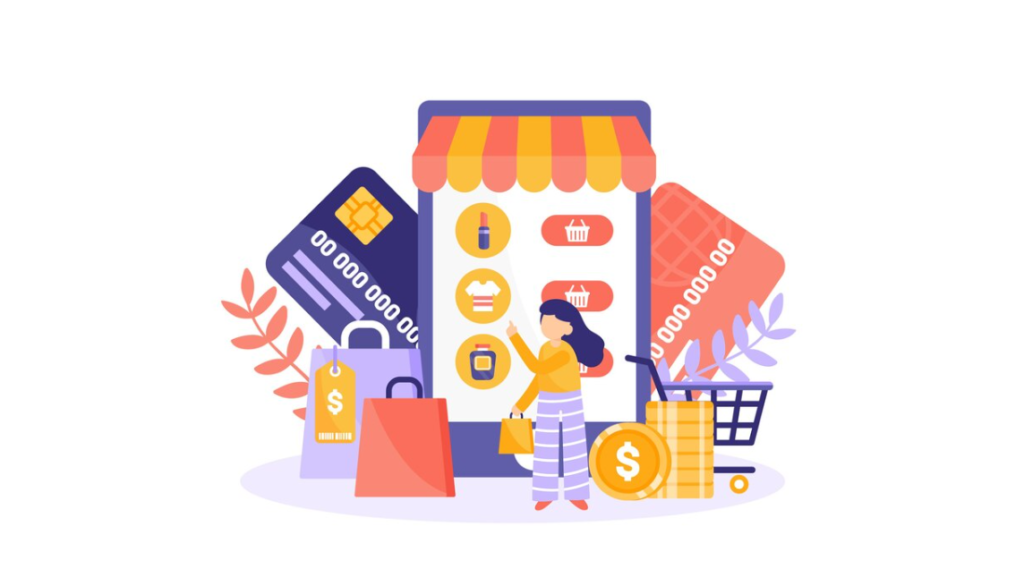In the rapidly evolving commerce landscape, eCommerce has seen a surge, but the real frontier is now m-Commerce. With a $40 billion market, m-commerce, driven by mobile apps, is transforming how consumers research and shop. The shift is evident – from occasional buyers to loyalists, mobile apps are becoming the 21st-century loyalty cards for global retail brands.
The Dominance of m-Commerce in the 21st Century
Lately, there’s been a notable surge in the eCommerce sector; however, it isn’t the ultimate shopping platform as m-commerce continues to grow in popularity. Are you familiar with m-Commerce and how it stands against eCommerce?
M-commerce is centered around transactions conducted via mobile devices, while e-commerce encompasses online shopping via websites. The mobile commerce sector has recently been valued at an impressive $40 billion. Brick-and-mortar retailers are witnessing an influx of customers who utilize mobiles for research either before or during their in-store shopping experiences.
The advent of retail apps has revolutionized shopping, allowing consumers to purchase items from home with ease and increasing the likelihood of turning occasional shoppers into dedicated fans of a brand.
It’s becoming evident that mobile apps are the modern-day loyalty cards – they serve as powerful and cost-effective tools for driving revenue for renowned retail brands globally. Recently, the market has seen a proliferation of retail business apps designed to simplify and enhance the shopping experience for consumers.
For those operating an eCommerce business, possessing a mobile app is crucial for success. Mobile app development opens a plethora of opportunities to engage with customers, advertise, and sell products more effectively.
Why Your eCommerce Store Needs a Mobile App for Market Flourish

In today’s market, it’s essential to grasp why mobile apps are becoming the preferred method of online shopping over traditional web browsers. Studies show a remarkable 78% of smartphone users favor mobile apps for their e-commerce activities, highlighting a definitive transformation in shopping habits. While tablet users distribute their time between browsers and apps, their overall contribution to web traffic is substantial.
This behavioral shift towards mobile app usage not only reflects changing consumer preferences but also signals a burgeoning opportunity for mobile app developers. It’s a clear indication that the e-commerce landscape is rapidly adapting to mobile-first strategies to meet customers where they are: on their phones. This trend is reshaping the online retail space, prompting e-commerce businesses to innovate and align with the mobile-centric approach that modern consumers are rapidly adopting.
The Convenience and Reach of Mobile Apps
It is widely acknowledged that applications offer a quicker and more reliable user experience compared to websites.
- In the contemporary landscape, mobile applications have emerged as the new-age communication tool, providing customers with a fresh and user-friendly experience;
- Apps exhibit greater responsiveness, with fewer connectivity issues and bugs in comparison to the latest mobile websites;
- Placing a logo strategically on the right side or front of a device enhances the likelihood of success and growth;
- In today’s era, users utilize smartphones equipped with internet connectivity and a variety of installed applications, making it feasible for a significant customer base to engage with retailers through their phones;
- Additionally, native mobile apps empower retailers to disseminate promotional content and push notifications, proving highly effective in marketing a brand across diverse applications and the internet;
- The noteworthy aspect of push notifications lies in their timeliness and direct reach to customers, regardless of their location;
- Ultimately, applications serve as powerful tools to incorporate features such as a camera, Bluetooth, address book, GPS, and more.
Realize Your Sales Goals Effectively
Unlocking the potential for achieving targeted sales has become a pivotal aspect of success in the dynamic landscape of mobile commerce. According to Juniper research, the mobile commerce market, which stood at £93 billion in 2013, is projected to surge to £2 trillion by 2018. The key to sustained success for retailers lies in their ability to anticipate and cater to the ever-evolving consumer behavior.
In this rapidly expanding eCommerce domain, mobile apps have emerged as powerful tools. The ASOS app, for instance, notched up an impressive 44% revenue share in 2018, marking substantial growth as reported by Internet Retailer Mobile. Undeniably, the future of the industry is intricately tied to mobile platforms, making applications an exceptional investment for eCommerce businesses. As consumer preferences continue to shift, adapting to the mobile-centric landscape becomes not just advantageous but essential for those aiming to thrive in the competitive world of eCommerce.
Individualized Shopping Experiences

The primary objective behind the development of mobile applications is to provide retailers with an extraordinary avenue for interaction with users, fostering a seamless communication channel between consumers and the brand. Leveraging the latest advancements in mobile technology, customers can be effortlessly engaged through push notifications, in-app messaging techniques, and widgets.
Sending interactive notifications proves to be a beneficial strategy for delivering personalized and relevant communication to customers. The integration of these sophisticated in-app rich messaging techniques and tactics creates an advanced and potent solution, enhancing conversion rates, generating profitable revenue, and fostering increased customer engagement.
Amplify Operational Efficiency
Ensure that crucial and highly relevant information, along with rewards for shoppers, is consolidated in one digital space. The utilization of mobile orders and payments has significantly elevated efficiency, minimizing wait times and reducing long queues. Leveraging mobile apps facilitates seamless ordering for shoppers, reducing the resource burden on physical stores. Additionally, mobile apps provide customers with digital receipts, contributing to the reduction of retail paper and waste.
Conclusion
These compelling reasons underscore the importance of having a mobile application for your eCommerce store to thrive and succeed in the market. The mobile app empowers customers to effortlessly perform various tasks, including making purchases, payments, and accessing information on offers and discounts, anytime and anywhere. You might be interested in key reasons for converting HTML websites to WordPress themes.